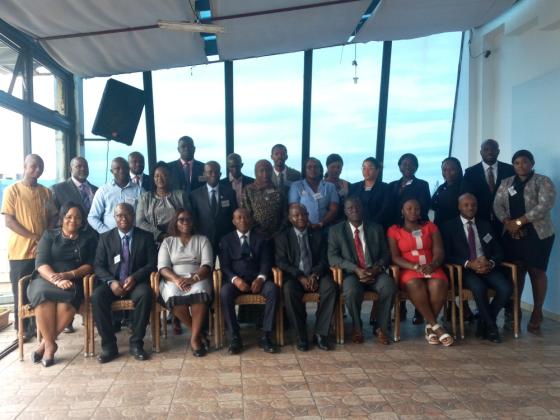Liberia: WAIFEM Opens Payment Systems, Capital Market Dev. Regional Course in Monrovia

The West African Institute for Financial and Economic Management (WAIFEM) has embarked on a week-long regional training course on payment systems and capital development markets for financial experts in Monrovia.
The course, which started on Monday, October 24, brought together senior officials from the central banks and other financial and economic departments of WAIFEM member countries, including The Gambia, Ghana, Liberia, and Nigeria, among others.
The mission of the Institute is to develop, on a sustainable regional basis, human and institutional expertise in the field of macroeconomic, fiscal, debt and financial management for central banks, ministries of finance and economic planning, and other public sector institutions with macroeconomic management responsibilities.
Given the welcome remarks on behalf of WAIFEM Director General, Dr. Baba Y. Musa, at the official opening of the training course in Monrovia, was Amadou S. Kora, WAIFEM Director for Financial Sector and Payment Systems. According to him, the course is designed to give participants an appreciable understanding of payments systems in general and capital market development, including policy and risk issues.
According to him, the weeklong regional training course is also intended to provide participants with an understanding of Real Time Gross Settlement (RTGS).
He further told the participants that payment systems are widely recognized as an important part of the financial infrastructure of a modern economy.
He said at the retail level, payment and settlement of transactions take place between individuals, families, and business firms while, at the wholesale level, large transactions between banks, businesses, and government agencies typically go through automated clearing houses.
He said recently that both levels of payment systems have undergone tremendous reforms with the increasing use of smart cards and the introduction of Real Time Gross Settlement (RTGS).
The Central Bank of Liberia (CBL) Executive Governor, J. Aloysius Tarlue, who served as keynote speaker, noted that central banks in the sub region have a huge interest in the stability of the financial system.
He said that payment systems are needed by economic agents for the effective and efficient transfer of monetary value. Investments, production, and exchange of goods and services depend on payment systems.
Tarlue, whose keynote address was contained in a speech delivered by Michael B. Ogun, CBL Senior Advisor on Multilateral Relations, stated on Monday, October 24, at the start of a weeklong regional training course on payment systems and capital market development, said that payment systems are an essential component of a financial system in a modern economy and is vital to the development of interbank money markets and securities markets.
He said that payment systems also enable the smooth interaction of all the operators in the conduct of economic activities. Thus, it has a role to play in economic growth and development. For these and other reasons, the safety and operational efficiency of the payment system is of concern to both market participants and public officials, notably central bankers.
“This stability depends, in part, on the integrity of the payment process,” he said. “An important two-way connection exists between the payment system and the stability of the banking and financial markets,” he added, stressing that confidence in individual financial institutions can be weakened by disruptions in the payment system. “Even if an institution plays a significant role in the payment system, its inability to meet settlement obligations could trigger a systemic problem.”
Tarlue added that the payment system is an essential component of the financial system in a modern economy and is vital to the development of interbank money markets and securities markets.
He added that the payment system has also been recognised as a confidence-building mechanism in the settlement process because it affects final settlements continuously rather than periodically at pre-specified times.
However, he stated that payment systems are fraught with a number of risks to the payment system's primary goal, which is the safe and efficient transfer of money.
Governor Tarlue disclosed that the thrust of payment system policy, therefore, should be to promote liquid money markets and the banking system, facilitate the conduct of monetary policy, and promote open and competitive financial markets.
“Many modes of payment exist, such as currency or cash, cashless paper-based instruments, and electronic money payments or transfers. However, in recent times, Real Time Gross Settlement (RTGS) has gained ascendancy, particularly for the settlement of high-value payments. So, what do we mean by RTGS?”, Tarlue asked.
Governor Tarlue’s statement further quoted the Committee on Payment and Settlement Systems of the Bank for International Settlements, defining RTGS as “a gross settlement system in which both processing and final settlement of funds transfer instructions can take place continuously (i.e. in real time). Thus, the immediacy of settlement is a key ingredient of RTGS.”
He informed the participants that the ongoing training brings together two critical changes to Africa’s trade finance: minimizing the use of hard currencies in trade payments and domesticating payments and settlements within Africa. This, in turn, will help organizations and their financiers manage currency risks better.
“On this note, it is my pleasure to declare open the regional course on Payment Systems and Capital Market Development. I wish you all a fruitful debate,” he concluded.
